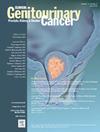Evaluation of the Effects of Enzalutamide and Abiraterone Acetate on Sarcopenia in Metastatic Castration-Sensitive Prostate Cancer
IF 2.7
3区 医学
Q3 ONCOLOGY
引用次数: 0
Abstract
Background
Sarcopenia is associated with worse prognosis and higher mortality in various solid tumors. We aim to evaluate the impact of enzalutamide and abiraterone acetate on sarcopenia in patients with metastatic castration-sensitive prostate cancer.
Materials and Methods
The skeletal muscle indexes (SMI, cm²/m²) were calculated from pre-treatment and 12th-month CT scans. Patients were categorized into sarcopenic and non-sarcopenic groups based on the predefined SMI and body mass index cut-off values. Baseline and 12th-month SMI values together with percentages of sarcopenic patients were compared between the enzalutamide and abiraterone acetate groups. Radiological progression-free survival (rPFS) and overall survival (OS) were also compared between sarcopenic and non-sarcopenic patients.
Results
We included 19 patients receiving enzalutamide and 30 patients receiving abiraterone acetate. In the enzalutamide group, SMI decreased significantly from pre-treatment to the 12th month (median ΔSMI: −3.1 cm2/m2, P = .004). In the abiraterone acetate group, SMI declined significantly over the same period (median ΔSMI: −4.1 cm2/m2, P = .001). There were no significant differences in SMI changes and sarcopenia rates between two groups. Median rPFS was 29 months in the pre-treatment sarcopenic group and 37 months in the non-sarcopenic group (HR = 2.38 [95% CI, 0.54-10.41], P = .24). Median OS was 33 months in the sarcopenic group and 47 months in the non-sarcopenic group (HR = 1.94 [95% CI, 0.42-9.03], P = .38).
Conclusion
Both enzalutamide and abiraterone acetate significantly reduces SMI values following a 12-month treatment period. Despite a trend toward shorter rPFS and OS in sarcopenic patients, the differences did not reach statistical significance.
恩杂鲁胺与醋酸阿比特龙治疗转移性去势敏感前列腺癌骨骼肌减少的疗效评价
背景:在各种实体肿瘤中,肌肉减少症与较差的预后和较高的死亡率相关。我们的目的是评估恩杂鲁胺和醋酸阿比特龙对转移性去势敏感前列腺癌患者肌肉减少症的影响。材料与方法通过治疗前和12个月CT扫描计算骨骼肌指数(SMI, cm²/m²)。根据预定义的SMI和体重指数临界值将患者分为肌肉减少组和非肌肉减少组。比较恩杂鲁胺组和醋酸阿比特龙组的基线值和12个月的SMI值以及肌肉减少症患者的百分比。还比较了肌肉减少症和非肌肉减少症患者的放射无进展生存期(rPFS)和总生存期(OS)。结果19例患者服用恩杂鲁胺,30例患者服用醋酸阿比特龙。在enzalutamide组,SMI从治疗前到第12个月显著下降(中位数ΔSMI:−3.1 cm2/m2, P = 0.004)。在醋酸阿比特龙组,SMI在同一时期显著下降(中位数ΔSMI:−4.1 cm2/m2, P = .001)。两组患者的重度精神障碍指数变化和肌肉减少率无显著差异。治疗前肌肉减少组的中位rPFS为29个月,非肌肉减少组的中位rPFS为37个月(HR = 2.38 [95% CI, 0.54-10.41], P = 0.24)。肌肉减少组的中位OS为33个月,非肌肉减少组的中位OS为47个月(HR = 1.94 [95% CI, 0.42-9.03], P = 0.38)。结论恩杂鲁胺和醋酸阿比特龙治疗12个月后均可显著降低SMI值。尽管肌少症患者的rPFS和OS有缩短的趋势,但差异没有达到统计学意义。
本文章由计算机程序翻译,如有差异,请以英文原文为准。
求助全文
约1分钟内获得全文
求助全文
来源期刊

Clinical genitourinary cancer
医学-泌尿学与肾脏学
CiteScore
5.20
自引率
6.20%
发文量
201
审稿时长
54 days
期刊介绍:
Clinical Genitourinary Cancer is a peer-reviewed journal that publishes original articles describing various aspects of clinical and translational research in genitourinary cancers. Clinical Genitourinary Cancer is devoted to articles on detection, diagnosis, prevention, and treatment of genitourinary cancers. The main emphasis is on recent scientific developments in all areas related to genitourinary malignancies. Specific areas of interest include clinical research and mechanistic approaches; drug sensitivity and resistance; gene and antisense therapy; pathology, markers, and prognostic indicators; chemoprevention strategies; multimodality therapy; and integration of various approaches.
 求助内容:
求助内容: 应助结果提醒方式:
应助结果提醒方式:


